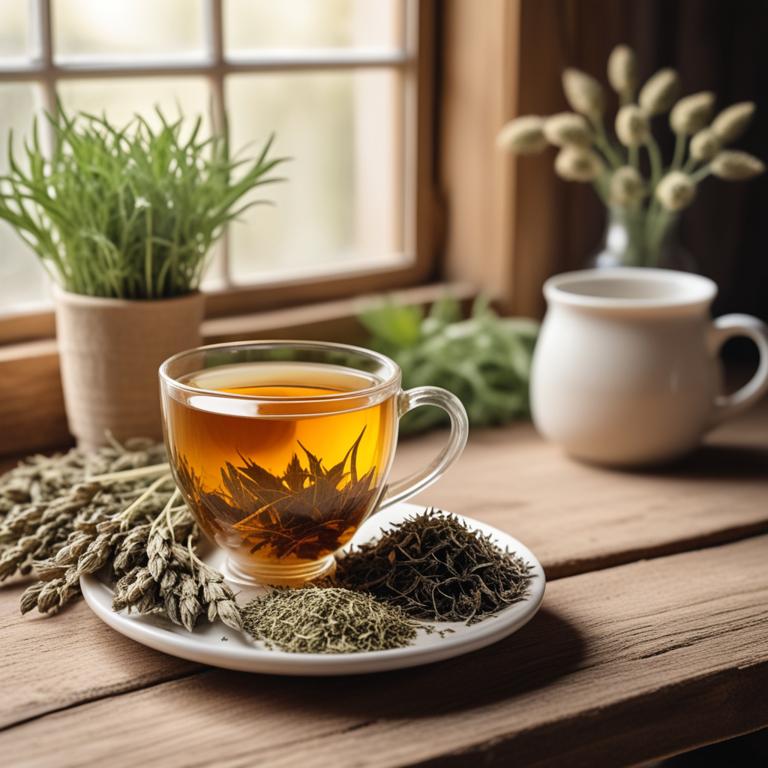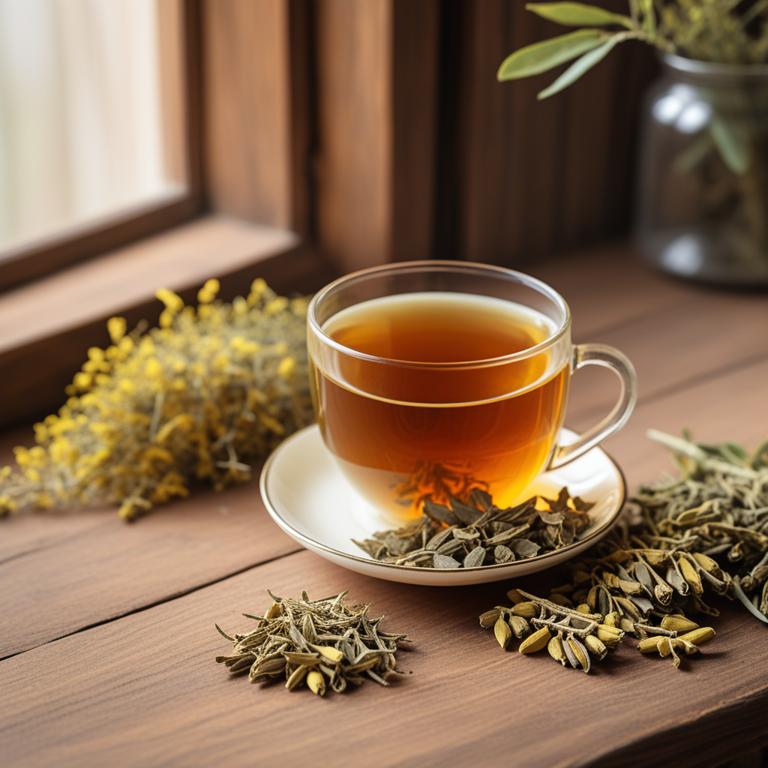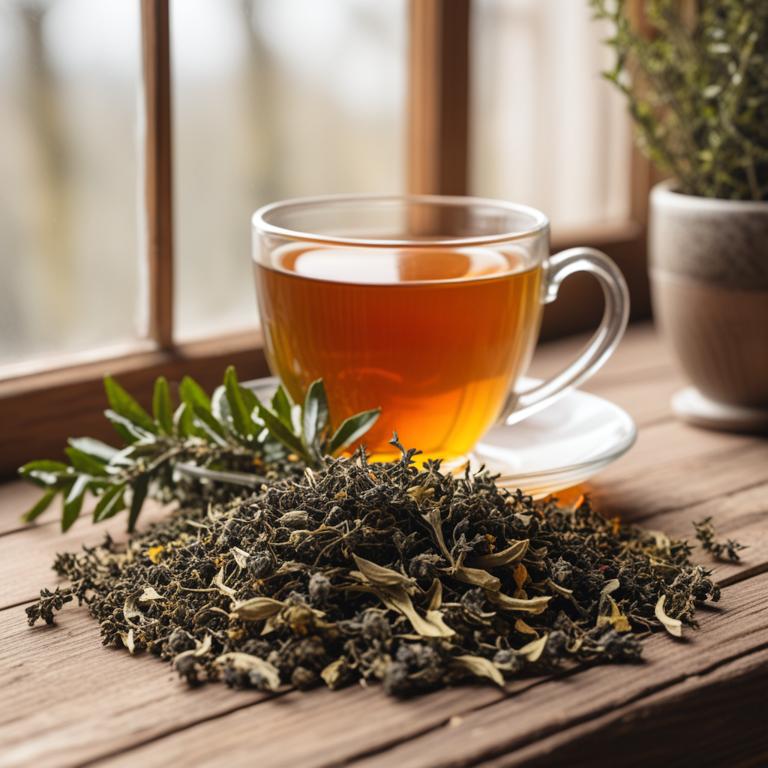13 Best Herbal Teas For Hemorrhoids

Herbal teas for Hemorrhoids are natural remedies made from various plants and herbs that are used to treat the symptoms of hemorrhoids, a painful and often embarrassing condition characterized by swollen veins in the rectal area.
These teas offer numerous benefits, including reducing inflammation, soothing itching and discomfort, and promoting digestion, which can help alleviate the symptoms of hemorrhoids.
Examples of herbal teas used to treat hemorrhoids include witch hazel, which has anti-inflammatory properties that can help reduce swelling; calendula, which has antiseptic properties that can help prevent infection; dandelion root, which can help stimulate digestion and reduce water retention; ginger, which has anti-inflammatory properties that can help reduce pain and discomfort; chamomile, which can help soothe and calm the digestive system; and marshmallow root, which can help protect and soothe the mucous membranes in the rectal area.
By incorporating these herbal teas into their diet, individuals can find natural relief from the symptoms of hemorrhoids and promote overall digestive health.
According to "Pharmaceutical biology", teas for hemorrhoids may potentially be effective in managing the condition due to the anti-inflammatory properties of certain plants used to treat hemorrhoids, such as Aloe vera.
Below there's a list of the 13 best herbal teas for hemorrhoids.
- 1. Aloe barbadensis teas
- 2. Hamamelis virginiana teas
- 3. Achillea millefolium teas
- 4. Cassia angustifolia teas
- 5. Ilex paraguariensis teas
- 6. Melissa officinalis teas
- 7. Urtica dioica teas
- 8. Avena sativa teas
- 9. Echinacea purpurea teas
- 10. Lavandula angustifolia teas
- 11. Silybum marianum teas
- 12. Cinchona officinalis teas
- 13. Eucalyptus globulus teas
Also you may be interested in...
TODAY'S FREE BOUNDLE
Herb Drying Checklist + Herbal Tea Shopping List + Medicinal Herbs Flashcards
Enter you best email address below to receive this bundle (3 product valued $19.95) for FREE + exclusive access to The Aphotecary Letter.
$19.95 -> $0.00
1. Aloe barbadensis teas

Aloe barbadensis teas have been traditionally used to treat hemorrhoids due to their anti-inflammatory, soothing, and astringent properties, which help to reduce swelling, pain, and bleeding associated with this condition.
The bioactive constituents of Aloe barbadensis, such as aloin, aloe-emodin, and acemannan, possess anti-inflammatory and antioxidant properties that aid in healing and soothing irritated tissues.
Drinking Aloe barbadensis teas may help to alleviate symptoms of hemorrhoids by reducing inflammation, promoting wound healing, and regulating bowel movements.
The benefits of using Aloe barbadensis teas to treat hemorrhoids include reduced pain and discomfort, faster recovery, and a reduction in the risk of complications associated with this condition.
2. Hamamelis virginiana teas

Hamamelis virginiana teas, also known as witch hazel, have been used for centuries to treat hemorrhoids due to their anti-inflammatory, astringent, and antiseptic properties.
These properties help to reduce swelling, itching, and bleeding associated with hemorrhoids, providing relief and promoting healing.
The bioactive constituents, including tannins, flavonoids, and alkaloids, in witch hazel contribute to its therapeutic effects by reducing inflammation, improving blood circulation, and protecting the affected area from further irritation.
Regular consumption of Hamamelis virginiana teas has been shown to be beneficial in treating hemorrhoids, providing fast relief and promoting long-term healing, making it a popular natural remedy for this common condition.
3. Achillea millefolium teas

Achillea millefolium teas, also known as yarrow tea, have been traditionally used to treat hemorrhoids due to its anti-inflammatory and astringent properties.
The bioactive constituents present in yarrow tea, including flavonoids, sesquiterpenes, and coumarins, help to reduce inflammation, alleviate pain, and promote healing in the affected area.
The astringent properties of yarrow tea help to constrict blood vessels, reducing bleeding and swelling associated with hemorrhoids.
By consuming yarrow tea, individuals may experience relief from the discomfort and pain associated with hemorrhoids due to its soothing and anti-inflammatory effects.
4. Cassia angustifolia teas

Cassia angustifolia teas have been traditionally used to treat hemorrhoids due to their astringent, anti-inflammatory, and soothing properties.
The bioactive constituents such as anthraquinones, specifically sennosides, help to reduce inflammation, alleviate pain, and promote bowel regularity, which are essential in treating hemorrhoids.
The herbal preparation helps to treat this ailment by shrinking swollen veins, reducing bleeding and discomfort, and promoting overall digestive health.
The benefits of using Cassia angustifolia teas to treat hemorrhoids include reducing symptoms, promoting faster healing, and minimizing the risk of complications, making it a popular natural remedy for this condition.
5. Ilex paraguariensis teas

Ilex paraguariensis teas, also known as mate teas, have been traditionally used to treat hemorrhoids due to their anti-inflammatory and soothing properties.
The bioactive constituents, including polyphenols, flavonoids, and saponins, help to reduce inflammation, promote healing, and improve blood circulation, thereby alleviating symptoms of hemorrhoids.
The saponins present in Ilex paraguariensis teas have been found to have astringent and antiseptic properties, which help to reduce swelling and prevent infection in the affected area.
Regular consumption of Ilex paraguariensis teas has been found to provide relief from painful and itchy hemorrhoids, as well as promote overall digestive health and reduce the risk of future occurrences.
6. Melissa officinalis teas

Melissa officinalis teas, also known as lemon balm, have been traditionally used to treat hemorrhoids due to their anti-inflammatory and antiseptic properties.
The herbal preparation helps to treat this ailment by reducing pain, inflammation, and discomfort associated with hemorrhoids, as well as promoting healing and preventing infection.
The bioactive constituents of Melissa officinalis, including rosmarinic acid, flavonoids, and terpenoids, contribute to its therapeutic effects by exerting antioxidant and anti-inflammatory activities.
The benefits of using Melissa officinalis teas to treat hemorrhoids include reduced swelling, improved digestion, and relief from itching and discomfort, making it a natural and effective remedy for this common condition.
7. Urtica dioica teas

Urtica dioica teas, also known as stinging nettle tea, have been traditionally used to treat hemorrhoids due to their anti-inflammatory and soothing properties.
The bioactive constituents, such as flavonoids and phenolic acids, help to reduce inflammation and ease discomfort associated with hemorrhoids.
The herbal preparation works by improving blood circulation, reducing swelling, and promoting the healing of irritated tissues, providing relief from itching and pain.
The benefits of using Urtica dioica teas to treat hemorrhoids include reduced inflammation, improved symptoms, and a decrease in the risk of complications, making it a popular natural remedy for this condition.
Related Study
According to the provided study, Urtica dioica teas for hemorrhoids have been previously used for medicinal purposes, as Urtica species have been historically used to treat various disorders, including hemorrhoids.
8. Avena sativa teas

Avena sativa teas, also known as oat seed tea, have been traditionally used to treat hemorrhoids due to their anti-inflammatory and soothing properties.
The bioactive constituents present in this herbal preparation, such as avenanthramides, beta-glucans, and phenolic acids, help to reduce swelling and alleviate pain associated with hemorrhoids.
Avena sativa teas work by promoting blood flow, reducing inflammation, and soothing the irritated tissues in the rectal area, providing relief from discomfort and promoting healing.
The benefits of using Avena sativa teas to treat hemorrhoids include reduced pain, inflammation, and bleeding, as well as improved overall digestive health and reduced risk of complications.
9. Echinacea purpurea teas

Echinacea purpurea teas have been traditionally used to treat hemorrhoids due to their anti-inflammatory, antiseptic, and astringent properties.
This herbal preparation helps to reduce swelling and alleviate pain associated with hemorrhoids by constricting blood vessels and promoting the formation of scar tissue.
The bioactive constituents, including alkylamides, flavonoids, and phenolic acids, in Echinacea purpurea teas exhibit these beneficial effects, thereby providing relief from discomfort and promoting healing of the affected area.
The benefits of using Echinacea purpurea teas to treat hemorrhoids include reduced inflammation, improved circulation, and accelerated recovery, making it a popular natural remedy for this common condition.
10. Lavandula angustifolia teas

Lavandula angustifolia teas have been traditionally used to treat hemorrhoids due to their anti-inflammatory, antiseptic, and astringent properties.
The bioactive constituents, including linalool and linalyl acetate, help to reduce inflammation, promote healing, and alleviate pain associated with hemorrhoids.
By reducing inflammation and promoting healing, Lavandula angustifolia teas can help to shrink the swollen veins and alleviate the discomfort and pain caused by hemorrhoids.
The benefits of using Lavandula angustifolia teas to treat hemorrhoids include reduced pain, inflammation, and bleeding, as well as improved digestion and bowel movements.
11. Silybum marianum teas

Silybum marianum teas have been traditionally used to treat hemorrhoids due to their anti-inflammatory, antiseptic, and astringent properties.
These properties help to reduce swelling, prevent infection, and constrict blood vessels, ultimately alleviating the symptoms of hemorrhoids.
The bioactive constituents of Silybum marianum, including flavonoids, phenolic acids, and saponins, are responsible for its therapeutic effects, which help to reduce pain, itching, and bleeding associated with hemorrhoids.
Regular consumption of Silybum marianum teas has been shown to provide relief from hemorrhoids by promoting healing, reducing inflammation, and preventing complications, making it a potential natural remedy for this condition.
Related Study
According to "Fitoterapia", Silybum marianum teas are used for hemorrhoids.
12. Cinchona officinalis teas

Cinchona officinalis teas have been traditionally used to treat hemorrhoids due to their anti-inflammatory, antiseptic, and astringent properties, which help to reduce swelling, prevent infection, and shrink the size of hemorrhoids.
The bioactive constituents present in these teas, such as quinine and tannins, help to constrict blood vessels and reduce bleeding, thereby alleviating symptoms of hemorrhoids.
The astringent properties of Cinchona officinalis teas also help to reduce the inflammation and itching associated with hemorrhoids, making it a beneficial herbal preparation for treating this ailment.
The benefits of using Cinchona officinalis teas to treat hemorrhoids include reduced pain and discomfort, decreased risk of infection, and promotion of overall digestive health, making it a natural and effective remedy for this common condition.
13. Eucalyptus globulus teas

Eucalyptus globulus teas have been traditionally used to treat hemorrhoids due to their anti-inflammatory, antiseptic, and astringent properties, which help to soothe and shrink inflamed tissues.
The bioactive constituents present in Eucalyptus globulus teas, such as flavonoids and terpenoids, have been found to possess analgesic and anti-edematous properties, making them effective in reducing pain and swelling associated with hemorrhoids.
This herbal preparation helps to treat hemorrhoids by reducing inflammation, promoting healing, and improving blood flow to the affected area, thereby alleviating symptoms such as itching, discomfort, and pain.
The benefits of Eucalyptus globulus teas in treating hemorrhoids include reduced inflammation, faster healing, and relief from symptoms, making it a popular natural remedy for this common condition.